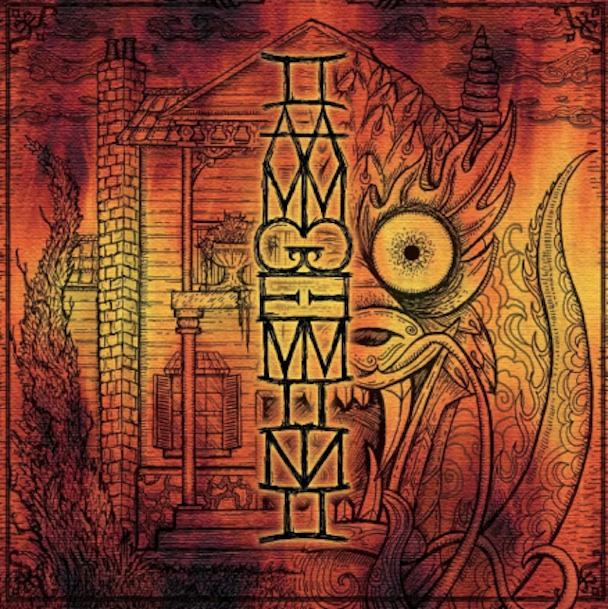There’s a Happy Hollow bonus track called, “No News is Bad News” where Tim Kasher sings, “It scares the shit out of me when weathered writers lose their steam / I’m only getting older and less interesting.” For years now, Kasher has seemingly been fighting that battle against writer’s block. In all of his projects he seems to attack the problem with one of two approaches: the shouted confessionals and meta songs that brought Cursive their initial breakthrough (e.g. The Ugly Organ, Mama, I’m Swollen or his recent solo album) and the attempts at short fiction in the confines of a song (e.g. Happy Hollow, or The Good Life’s Help Wanted Nights). Cursive’s latest, I Am Gemini, functions in the latter space. It’s his most ambitious attempt at storytelling yet, but it ultimately stumbles to be puzzling and uninspiring.
The thing listeners should know – and they’ve been very good at hammering it home – is that this is actually a surreal play about Cassius and Pollock, twin brothers of opposite virtues, separated at birth. It even has a supplemental script/lyrics sheet, which is the only way to decode the intent and direction of the story. Kasher wrote the album, first track to last, then took it to his band to hammer them into music. Considering the potential awkwardness of this process, they do a surprisingly decent job of making them sound purposeful and coherent. There is never a moment where you think, “They’re really stretching to turn this into a verse.” But there’s never a moment where you feel like they’ve crafted a great song, either.
Here’s the main problem: because the script is so vital to parsing out some story, there are two ways to listen to the album: just as 13 songs with no context, or as a companion piece to a play. As an album alone, it’s mostly unremarkable. It starts off strong enough with “This House Alive,” one of the few consistently engaging songs on the album, serving as the introduction to the images and characters that populate the subsequent 12 tracks. It begins from a place of weariness and mystery, picking up vitality and drama as it transforms into a full-fledged anthemic pop punk rouser. Sure, none of the lyrics are grounded in anything concrete or relatable, but that will come over time, right?
Not really. Without context, the words are mysterious abstractions that make it hard to glean not just meaning, but the basic tension and urgency of the song. Everything from character names, scene settings, actions, even the story’s final reveal are invisible in the songs. So “Wowowow” just sounds like a generic dark carnival song, when in reality Pollock has just kidnapped his brother after operating on his brain with the aid of a pack of devils.
Since the words are without an anchor, it’s up to the music to try and reel in listeners. The rest of Cursive does their best to convey their parts of the narrative with shifting song structures and dissonant guitar riffs. It comes out okay, but only okay. The problem is that, because of the demonic and surreal subject matter, the prime mood they’re trying to convey falls somewhere between demented madness and supernatural evil. It’s constant. Cursive has always been adept as using dissonant noise to great effect, but that was always tempered later on by something lighter, or prettier, or sympathetically human.
For this album, they’re permanently in “Bloody Murderer” mode. They’ll regularly work in a great melody, or even sound playful at times, but it’s wiped out quickly with the next angry, ugly schizophrenic riff in service of portraying a pack of devils pouring elixirs into the characters or something. That has it’s own worth – not everything has to be pretty – but only if it’s piercing and harrowing enough to be a thrill every time. Instead it feels like a writing exercise, with little of the human connection that makes their other sinister-sounding works click.
Assuming that taking it as an album alone is the wrong way to approach I Am Gemini, that you have to read and listen to the story to really “get it” how does it shake out? It’s certainly better, but that revelation is almost a little frustrating in itself, as if so much important stuff was withheld from you. It’s not a failure of a story at all. Consumed as a whole, it comes off as an intriguing, surreal stage play that touches on inherent evil, rehabilitation and abortion. Suddenly, lines such as, “Who was there, engorged in Gomorrah, who do you think was dancing in the sulfur?” come off as performances instead of bad hints at what it’s saying. Yet above all, it’s mostly puzzling. Even though it comes off a little better, it still begs the question why it has to be presented in the this medium – a half-album and short script. I can’t imagine anyone thinking, “That scene where Cassius attempts to kill Pollock but finds his scar on his head is great – I want to listen to it again.” They’ve hobbled the record from standing on its own in order to tell a story in a format that doesn’t take advantage of its strengths.
Despite all this, it’s probably the most unique and forward-thinking thing Cursive has done in years. It’s just not successful across the board and its very presentation is a frustrating decision. The moments of brightness – some poetry here, a brief pop moment there – will get most listeners through the album, but won’t inspire them to keep coming back.

